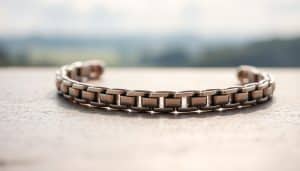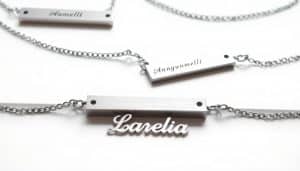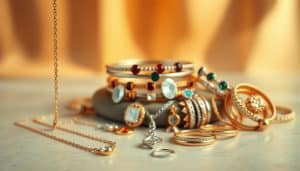Nickel-Free Jewelry: Hypoallergenic Options for You
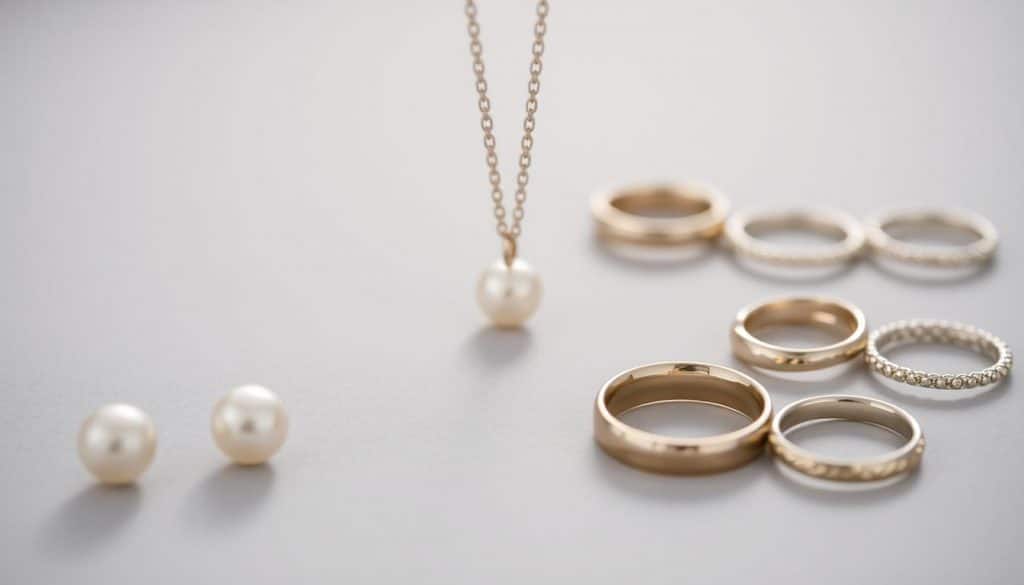
Nickel-Free Jewelry: Hypoallergenic Options for You
We understand the importance of wearing hypoallergenic jewelry that not only complements your style but also ensures comfort and safety for your skin.
For individuals with sensitive skin, finding the right jewelry can be challenging. That’s why we specialize in creating nickel-free jewelry that is both stylish and safe to wear.
Our collection is designed to provide a stylish solution without compromising on quality or comfort. We use high-quality materials that are gentle on the skin, making our jewelry perfect for everyday wear.
Key Takeaways
- Hypoallergenic jewelry is designed for sensitive skin.
- Nickel-free materials ensure comfort and safety.
- Our jewelry is crafted with high-quality, skin-friendly materials.
- Perfect for everyday wear without irritation.
- Stylish designs that complement your personal style.
Understanding Nickel Allergies and Jewelry Sensitivity
The prevalence of nickel allergies has led to an increased demand for nickel-free jewelry options. Nickel is the number one allergen in frequency of positive patch test reactions, with 16.2% of the US population showing a positive reaction according to the North American Contact Dermatitis Group (NACDG).
Nickel allergies are more common than you might think, and they can cause significant discomfort. Understanding what causes these allergies and how they manifest is crucial in making informed choices about the jewelry you wear.
What Causes Nickel Allergies?
Nickel allergies are caused by exposure to nickel, a metal commonly used in jewelry due to its durability and affordability. When nickel comes into contact with the skin, it can cause an allergic reaction, leading to a condition known as contact dermatitis.
The symptoms of nickel contact dermatitis can vary from person to person but often include redness, itching, and inflammation. In severe cases, it can lead to blistering and crusting of the skin.
Common Symptoms of Nickel Contact Dermatitis
The symptoms of nickel contact dermatitis can be uncomfortable and unsightly. Some common symptoms include:
- Redness and inflammation
- Itching and burning sensations
- Blistering and crusting of the skin
- Dry, scaly patches
These symptoms can occur shortly after exposure to nickel or may develop over time with repeated exposure.
Why Jewelry Often Contains Nickel
Despite the potential for causing allergic reactions, nickel is often used in jewelry due to its beneficial properties. Nickel alloys are strong, durable, and resistant to corrosion, making them ideal for creating intricate designs and details.
However, with the growing awareness of nickel allergies, many manufacturers are now opting for nickel-free or hypoallergenic materials. These alternatives provide the same aesthetic appeal without the risk of causing skin irritation.
To better understand the prevalence of nickel allergies and the shift towards hypoallergenic jewelry, let’s examine some key statistics:
| Statistic | Percentage |
|---|---|
| Positive patch test reactions to nickel | 16.2% |
| Population affected by nickel contact dermatitis | 8-10% |
| Growth in demand for hypoallergenic jewelry | 25% annually |
The Importance of Choosing Nickel Free Jewelry
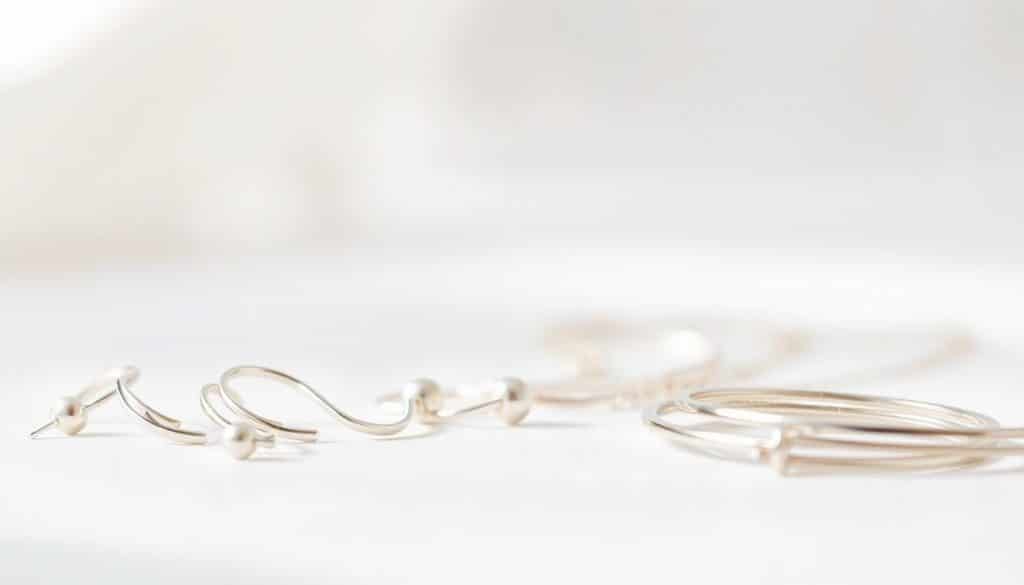
Selecting nickel-free jewelry is a crucial decision for individuals who prioritize their health and well-being. Nickel allergies and sensitivities are increasingly common, and the jewelry we wear can play a significant role in either exacerbating or alleviating these conditions. Limiting exposure to items that aren’t nickel-free is often cited as the primary method for managing nickel allergy.
Health Benefits of Hypoallergenic Jewelry
Hypoallergenic jewelry, particularly those made from nickel-free materials, offers numerous health benefits. The most immediate advantage is the reduction in skin irritation and allergic reactions. Nickel-free earrings and other hypoallergenic jewelry pieces are designed to minimize contact dermatitis, a common condition associated with nickel exposure. By choosing skin-friendly jewelry, individuals can enjoy wearing accessories without the discomfort and health risks associated with nickel.
Moreover, hypoallergenic jewelry is not just beneficial for those with diagnosed nickel allergies. It is also a proactive choice for anyone looking to avoid potential skin issues. The use of high-quality, hypoallergenic materials in jewelry making has become more prevalent, making it easier for consumers to find skin-friendly options.
Long-term Effects of Nickel Exposure
The long-term effects of nickel exposure can be significant, ranging from chronic skin irritation to more severe health issues. Continuous exposure to nickel can lead to persistent dermatitis, making it essential to limit contact with nickel-containing items. Moreover, there is ongoing research into the potential systemic health effects of prolonged nickel exposure, including its impact on the immune system.
By opting for hypoallergenic jewelry, individuals can significantly reduce their risk of nickel-related health issues. This choice is particularly important for those who wear jewelry daily, as prolonged exposure to nickel can have lasting health consequences. As consumers become more aware of these risks, the demand for nickel-free and hypoallergenic jewelry continues to grow.
Truly Hypoallergenic Metals for Sensitive Skin
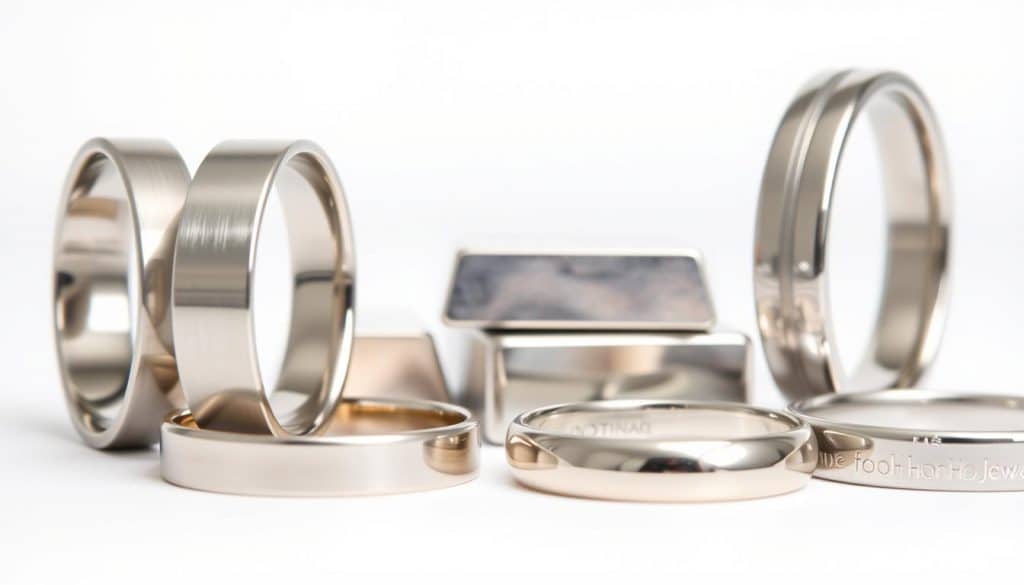
Sensitive skin demands jewelry crafted from metals that are inherently hypoallergenic, reducing the likelihood of irritation. When selecting jewelry, it’s crucial to understand the properties of different metals and their potential impact on skin health.
Surgical Stainless Steel
Surgical stainless steel is a popular choice for hypoallergenic jewelry due to its durability and resistance to corrosion. This metal is often used in medical implants and surgical instruments, making it an ideal material for sensitive skin. The most common type used in jewelry is 316L stainless steel, which contains a mix of chromium, nickel, and molybdenum. However, the nickel content is typically bound within the alloy, minimizing the risk of nickel release and subsequent skin irritation.
Titanium Jewelry Options
Titanium is another highly hypoallergenic metal, known for its strength, lightweight properties, and corrosion resistance. Titanium jewelry is often preferred by individuals with severe metal allergies because it is completely nickel-free and has a natural oxide layer that prevents irritation. Titanium can be anodized in various colors, making it a versatile choice for jewelry.
Pure Gold and Platinum
Both pure gold and platinum are considered hypoallergenic due to their inert nature. Pure gold (24K) is less likely to cause allergic reactions, but it’s soft and often alloyed with other metals for durability. Platinum is also hypoallergenic and more durable than gold, making it suitable for jewelry. However, some alloys may contain other metals that could potentially cause irritation.
Sterling Silver: Is It Nickel-Free?
Sterling silver, composed of 92.5% silver and 7.5% other metals (usually copper), is generally considered hypoallergenic. However, some sterling silver pieces may contain nickel or other potentially irritating metals as part of the alloy or plating. To ensure hypoallergenicity, it’s essential to choose sterling silver jewelry that is explicitly labeled as nickel-free.
| Metal | Hypoallergenic Properties | Common Uses in Jewelry |
|---|---|---|
| Surgical Stainless Steel | Highly resistant to corrosion, nickel content is bound | Earrings, necklaces, bracelets |
| Titanium | Nickel-free, natural oxide layer prevents irritation | Rings, earrings, body jewelry |
| Pure Gold | Inert, less likely to cause allergic reactions | Wedding bands, pendants |
| Platinum | Hypoallergenic, durable | Engagement rings, luxury jewelry |
| Sterling Silver | Generally hypoallergenic, but may contain nickel | Earrings, pendants, rings |
As we have seen, various metals offer hypoallergenic properties that can cater to sensitive skin. By choosing jewelry made from these materials, individuals can enjoy stylish accessories without compromising their skin health.
Alternative Materials for Nickel-Free Jewelry
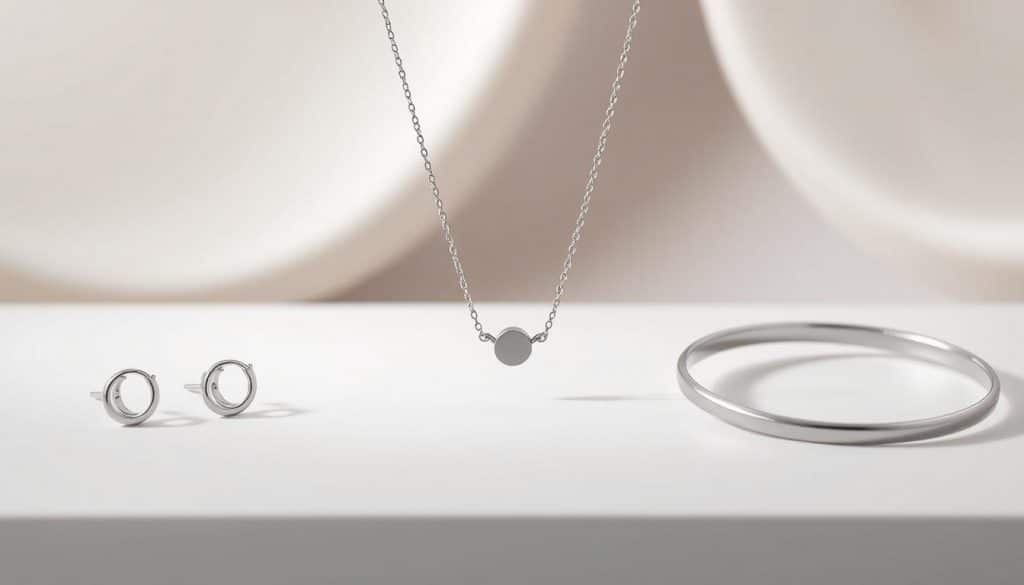
Beyond traditional metals, our collection includes a variety of alternative materials for nickel-free jewelry that cater to different tastes and preferences. These materials not only provide comfort but also add a unique touch to the jewelry pieces.
Silicone and Plastic Options
Silicone jewelry has gained popularity due to its flexibility, durability, and comfort. It’s an excellent choice for those with sensitive skin, as it’s hypoallergenic and resistant to irritation. Silicone jewelry comes in various colors and styles, making it versatile for different occasions.
Benefits of Silicone Jewelry:
- Soft and flexible
- Water-resistant
- Easy to clean
- Hypoallergenic
Plastic jewelry, on the other hand, offers a wide range of colors and designs. While not as durable as silicone, it is lightweight and can be a fun, affordable option for those looking for trendy pieces.
Wood and Natural Materials
Wooden jewelry has become increasingly popular for its natural look and feel. Each piece is unique, with natural patterns and textures that can’t be replicated. Wood is a hypoallergenic material, making it suitable for sensitive skin.
Types of Wood Used:
| Type of Wood | Characteristics |
|---|---|
| Ebony | Dark, dense, and fine-grained |
| Mahi Mahi | Colorful, with a natural sheen |
| Sandalwood | Aromatic, with a smooth texture |
Ceramic and Glass Jewelry
Ceramic jewelry is known for its vibrant colors and durability. It’s hypoallergenic and resistant to scratches, making it a great option for daily wear. Glass jewelry, similarly, offers a wide range of colors and styles, and when made properly, it can be very comfortable for sensitive skin.
Advantages of Ceramic and Glass Jewelry:
- Hypoallergenic
- Durable
- Variety of colors and designs
- Can be made with intricate details
Our collection includes a variety of styles to suit every taste, from elegant crystal earrings to classic pearl earrings, ensuring that there’s something for everyone.
Nickel Free Earrings for Sensitive Ears
Nickel-free earrings have become a necessity for many, offering a solution to allergic reactions and irritation. For individuals with sensitive ears, the right earrings can make all the difference in comfort and style.
Best Metals for Ear Piercings
When it comes to ear piercings, the metal used is crucial. We recommend using metals like ASTM-F138 stainless steel or ASTM-F136 implant-grade titanium. These metals are known for their hypoallergenic properties and are less likely to cause irritation.
Other suitable options include:
- Niobium, which is known for its biocompatibility
- Pure gold (14k or 18k), which is less likely to contain nickel when it’s not mixed with other metals
- Platinum, a rare and durable metal that’s also hypoallergenic
Stud vs. Dangle Earrings: What’s Safer?
The design of the earrings can also impact comfort. Stud earrings are generally safer for sensitive ears because they have less contact with the skin and are less likely to cause irritation. On the other hand, dangle earrings can sometimes cause more irritation due to the increased movement and contact with the skin.
However, with the right metal and proper care, dangle earrings can also be a safe choice. It’s essential to weigh the benefits and potential drawbacks based on individual sensitivity.
Top Brands for Hypoallergenic Earrings
Several brands specialize in hypoallergenic earrings, catering to those with sensitive ears. Some of the top brands include:
| Brand | Notable Features |
|---|---|
| Brand A | Uses ASTM-F136 titanium for all earrings |
| Brand B | Offers a wide range of nickel-free stud earrings |
| Brand C | Specializes in hypoallergenic dangle earrings made from niobium |
By choosing the right metal and style, individuals with sensitive ears can enjoy wearing earrings without the discomfort of allergic reactions.
Nickel Free Necklaces: Chains and Pendants
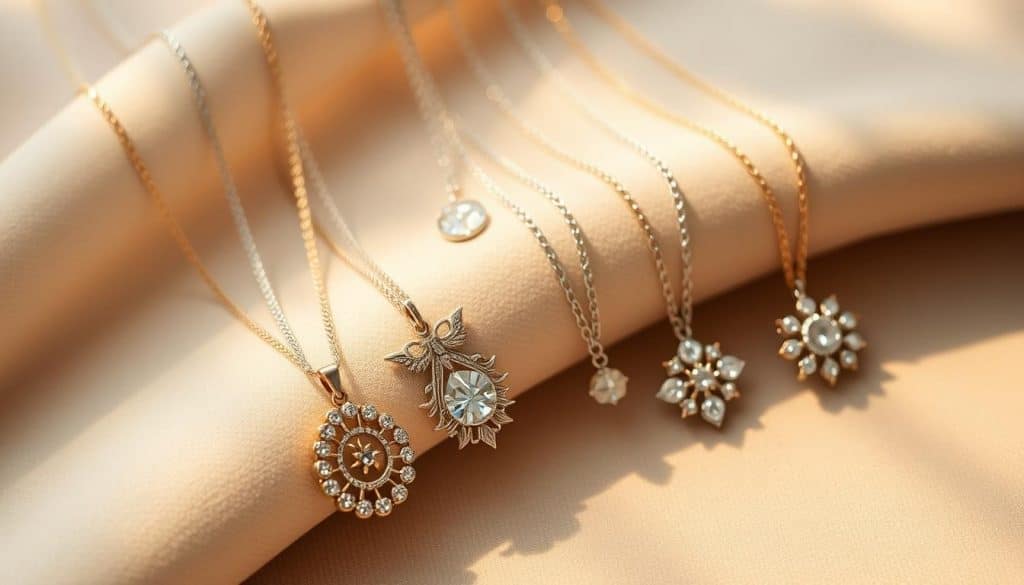
For individuals with sensitive skin, hypoallergenic necklaces offer a comfortable and fashionable choice. Our nickel-free jewelry collection includes elegant necklaces made from hypoallergenic materials, ensuring that you can enjoy wearing beautiful pieces without worrying about skin irritation.
Hypoallergenic Chain Materials
When it comes to hypoallergenic necklaces, the chain material is crucial. We recommend the following materials for their safety and durability:
- Surgical Stainless Steel: Known for its resistance to corrosion and hypoallergenic properties, making it an excellent choice.
- Titanium: Lightweight and strong, titanium is ideal for those with sensitive skin.
- Niobium: This metal is often used in hypoallergenic jewelry due to its biocompatibility.
- Gold and Platinum: Pure gold and platinum are naturally hypoallergenic, though often alloyed with other metals for strength.
Pendant Options That Won’t Irritate
Pendants can be made from a variety of materials, and when choosing, it’s essential to consider the metal used, as well as any coatings or platings. Some safe options include:
- Ceramic Pendants: Made from hypoallergenic materials, these are perfect for sensitive skin.
- Wood and Natural Materials: These offer a unique and safe alternative to metal pendants.
- Stainless Steel and Titanium Pendants: These metals are durable and hypoallergenic.
Recommended Brands and Styles
Several brands specialize in hypoallergenic jewelry, offering stylish and safe options. Some of our recommended brands include:
- Brand A: Known for their surgical stainless steel necklaces.
- Brand B: Offers a range of titanium and niobium hypoallergenic necklaces.
- Brand C: Specializes in pure gold and platinum hypoallergenic jewelry.
When shopping for nickel-free necklaces, it’s not just about the brand; it’s also about understanding the materials and construction. Always check the product description for hypoallergenic materials and consider the style that best suits your needs.
Nickel Free Bracelets and Watches
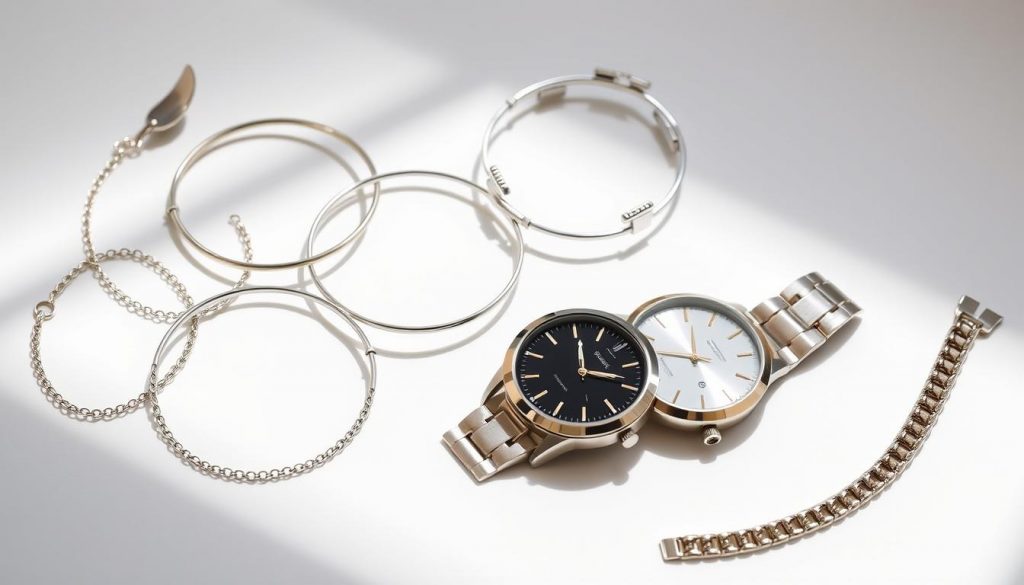
We understand the importance of hypoallergenic wrist jewelry, which is why we offer a range of nickel-free options that are both stylish and comfortable. Our collection includes bracelets and watches made from materials that are gentle on the skin, ensuring that everyone can enjoy wearing wrist jewelry without the risk of irritation.
Metals and Materials for Wrist Jewelry
When it comes to wrist jewelry, the choice of metal or material is crucial for those with nickel allergies. We utilize hypoallergenic materials such as surgical stainless steel, titanium, and pure gold in our bracelets and watches. These materials are not only nickel-free but also durable and resistant to corrosion, making them ideal for daily wear.
Some of the key characteristics of these materials include:
- Surgical stainless steel: resistant to tarnish and corrosion
- Titanium: lightweight and strong, with a naturally hypoallergenic surface
- Pure gold: available in 14k or 18k, it’s a classic choice for sensitive skin
Watch Cases and Bands for Sensitive Skin
For watches, both the case and the band are critical in determining hypoallergenic compatibility. We offer watch cases made from hypoallergenic metals and bands crafted from silicone, leather (treated to be nickel-free), or fabric. These options ensure that our watches are not only stylish but also safe for wearers with sensitive skin.
Key considerations for watch bands include:
- Silicone bands: flexible, durable, and easy to clean
- Leather bands: treated to be nickel-free, offering a classic look
- Fabric bands: breathable and comfortable, ideal for everyday wear
Top Hypoallergenic Bracelet Brands
We partner with top brands that prioritize hypoallergenic properties in their jewelry. Some of our featured brands include:
- Brand A: Known for their surgical stainless steel bracelets
- Brand B: Offers a range of titanium jewelry that’s both durable and hypoallergenic
- Brand C: Specializes in pure gold and platinum jewelry, catering to those with sensitive skin
By choosing nickel-free bracelets and watches from our collection, you’re not only ensuring comfort but also embracing style and quality. Our hypoallergenic wrist jewelry is designed to be worn daily, with a focus on durability and aesthetic appeal.
Nickel Free Rings for Daily Wear
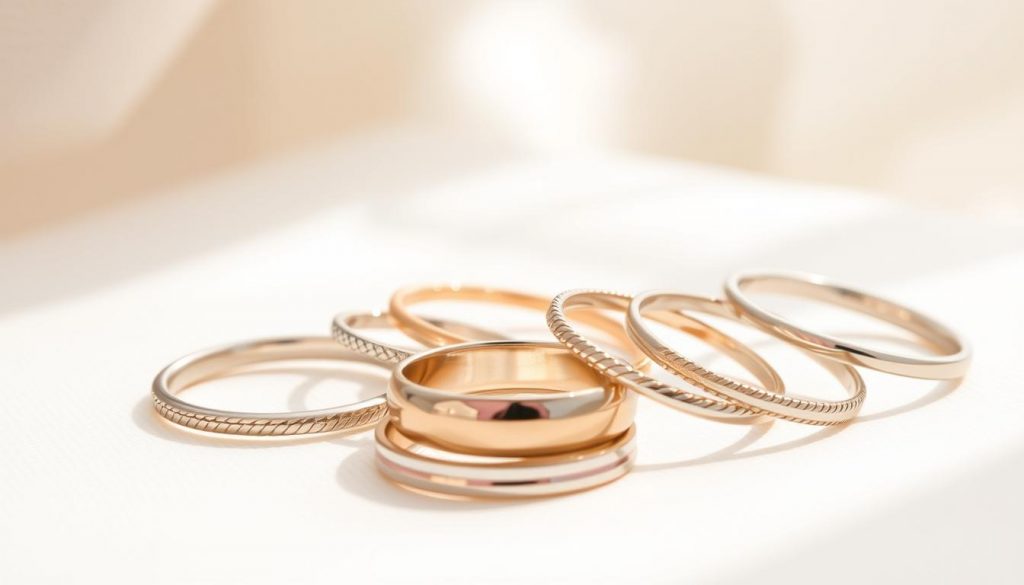
Daily wear rings that are nickel-free are not only a health-conscious choice but also a stylish one. For individuals with sensitive skin, traditional jewelry can often cause irritation, making hypoallergenic options a necessity.
Wedding and Engagement Ring Options
When it comes to wedding and engagement rings, couples often look for durability, beauty, and comfort. Solid 14k or higher nickel-free white or yellow gold is highly recommended for those with nickel allergies. These materials are not only hypoallergenic but also durable and resistant to tarnish.
“According to industry experts, ‘The key to a comfortable and safe wedding ring is choosing a material that is inherently hypoallergenic, such as platinum or high-karat gold.'” –
Fashion Rings for Sensitive Fingers
Fashion rings are a great way to add some personality to your outfit, and with nickel-free options, you don’t have to worry about discomfort. Materials like surgical stainless steel and titanium are popular choices for fashion rings due to their hypoallergenic properties and modern look.
- Surgical stainless steel for its strength and resistance to corrosion
- Titanium for its lightweight and hypoallergenic nature
- Pure gold and platinum for their luxury feel and inherent hypoallergenicity
Caring for Your Hypoallergenic Rings
To keep your nickel-free rings in good condition, regular care is essential. Cleaning with mild soap and water is a good start. For more intricate designs, consider using a soft-bristled brush to remove any debris.
As jewelry experts, we recommend storing your rings separately to prevent scratching and tangling. Regular inspections by a professional can also help maintain the integrity of your hypoallergenic rings.
How to Identify Truly Nickel-Free Jewelry
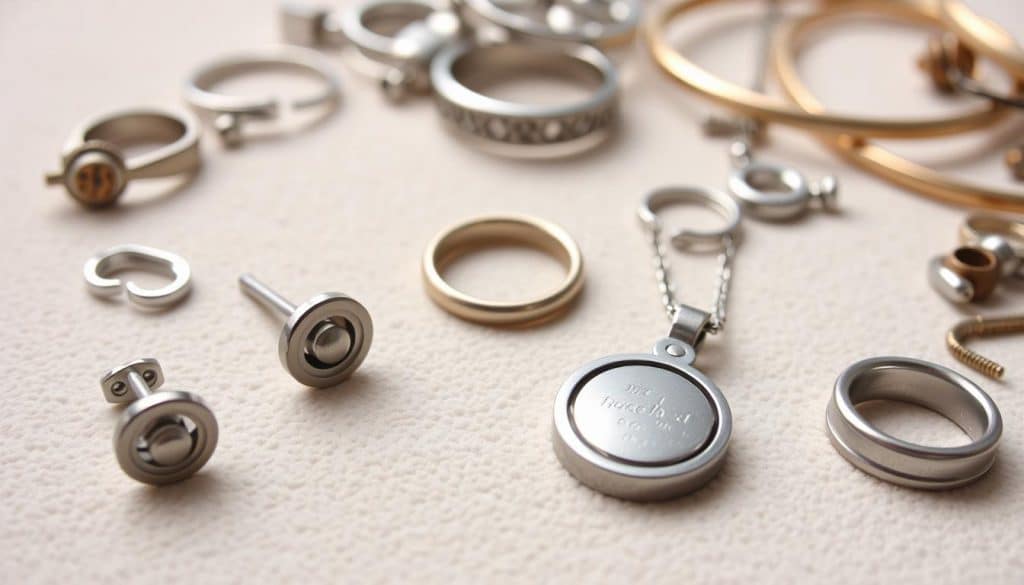
Nickel-free jewelry identification requires attention to detail and understanding of labeling standards. With the increasing prevalence of nickel allergies, consumers must be vigilant when selecting jewelry.
Understanding Jewelry Labeling and Standards
Jewelry labeling is crucial for identifying nickel-free products. Look for certifications like “nickel-free” or “hypoallergenic,” which indicate compliance with specific standards. In the United States, the American Society for Testing and Materials (ASTM) sets guidelines for nickel content in jewelry.
When shopping, check for labels or documentation that guarantee the jewelry meets nickel-free standards. Some brands also provide testing reports or certifications from third-party labs.
Testing Kits and Methods
For added assurance, you can use nickel testing kits. These kits typically include a solution that changes color when nickel is present. While not foolproof, they can provide a quick indication of whether a piece contains nickel.
| Testing Method | Description | Reliability |
|---|---|---|
| Nickel Testing Kits | Chemical solution that changes color with nickel presence | Moderate |
| X-Ray Fluorescence (XRF) | Non-destructive analysis using X-rays to detect elements | High |
| Certification by Reputable Labs | Third-party testing and certification | Very High |
Questions to Ask Jewelers and Retailers
When purchasing jewelry, don’t hesitate to ask questions. Inquire about the materials used, the manufacturing process, and any nickel testing that has been conducted. Reputable sellers should be transparent about their products.
- What materials are used in this jewelry piece?
- Has the jewelry been tested for nickel content?
- Can you provide certification or documentation?
By being informed and asking the right questions, you can confidently choose nickel-free jewelry that meets your needs.
Shopping for Nickel Free Jewelry Online
When it comes to buying nickel-free jewelry online, there are several factors to consider to ensure a satisfactory purchase. The convenience of online shopping is undeniable, but it requires a discerning approach to find truly hypoallergenic options.
Reliable Online Retailers Specializing in Hypoallergenic Options
We recommend looking for online retailers that specialize in hypoallergenic jewelry. Some notable examples include:
- Catbird: Known for their delicate, nickel-free designs.
- Alex and Ani: Offers a range of hypoallergenic jewelry options.
- BaubleBar: Provides detailed product descriptions and is committed to using hypoallergenic materials.
These retailers often provide detailed product descriptions and have good return policies, making it easier to shop with confidence.
Reading Product Descriptions Effectively
Understanding product descriptions is crucial when shopping online for nickel-free jewelry. Look for:
- Material Disclosure: Ensure the retailer clearly states the materials used.
- Nickel-Free Certification: Some products may carry nickel-free certifications or compliance with certain standards.
- Allergen Information: Details about potential allergens or irritants.
By paying close attention to these details, you can make more informed purchasing decisions.
Return Policies and Guarantees to Look For
A good return policy is essential when buying jewelry online, especially if you’re sensitive to certain materials. Look for retailers that offer:
- Flexible Return Windows: Allows you to return or exchange items that cause irritation.
- Clear Return Instructions: Makes the process straightforward and hassle-free.
- Satisfaction Guarantees: Some retailers offer guarantees that the product will be hypoallergenic.
By considering these factors, you can shop for nickel-free jewelry online with greater confidence.
Caring for Your Hypoallergenic Jewelry
Caring for your hypoallergenic jewelry is crucial for its longevity and your skin’s health. Proper care and maintenance can extend the life of your jewelry and prevent skin irritation. We will guide you through the best practices for cleaning, storing, and maintaining your hypoallergenic jewelry.
Cleaning Methods That Preserve Metal Integrity
Cleaning your hypoallergenic jewelry regularly is essential to maintain its appearance and prevent the buildup of bacteria and other contaminants. Use mild soap and warm water to clean your jewelry. Avoid harsh chemicals, abrasive materials, or ultrasonic cleaners that can damage the metal or harm the hypoallergenic properties.
- For surgical stainless steel and titanium jewelry, a soft-bristled toothbrush can be used to gently scrub intricate designs.
- For gold and platinum pieces, a mild soap solution is recommended. Avoid using bleach or ammonia-based cleaners.
- Sterling silver jewelry can be cleaned with a silver polishing cloth to maintain its shine and prevent tarnish.
Storage Tips to Prevent Contamination
Proper storage is vital to prevent your hypoallergenic jewelry from coming into contact with allergens or being contaminated. Store each piece separately in a soft pouch or a lined jewelry box to prevent scratching and tangling.
- Keep your jewelry away from direct sunlight and moisture to prevent tarnishing.
- Use anti-tarnish strips or silica gel packets in your storage container to absorb moisture.
- Avoid storing different types of metals together, as they can react with each other.
When to Replace or Repair Pieces
Even with proper care, jewelry can wear out over time. Knowing when to replace or repair your hypoallergenic jewelry is crucial. Inspect your jewelry regularly for signs of wear, such as loose stones, bent clasps, or worn-out coatings.
- If you notice any damage, take your jewelry to a professional jeweler for repair.
- Consider replacing jewelry that has been severely damaged or has worn out beyond repair.
- Regular maintenance can help extend the life of your jewelry and keep it looking its best.
By following these care and maintenance tips, you can enjoy your hypoallergenic jewelry for years to come while keeping your skin safe and healthy.
Budget-Friendly Nickel Safe Jewelry Options
You don’t have to compromise on style or sensitivity with budget-friendly nickel-free jewelry. We understand the importance of affordability without sacrificing quality, and there are several options available in the market that cater to sensitive skin.
Affordable Brands That Prioritize Sensitivity
Several brands have made it their mission to provide hypoallergenic jewelry at affordable prices. These brands understand the need for nickel-free options and offer a range of stylish choices.
Brands Offering Quality Hypoallergenic Jewelry at Affordable Prices
Some notable brands include:
- Brand A: Known for their surgical stainless steel jewelry, which is both durable and hypoallergenic.
- Brand B: Offers a wide range of titanium jewelry that is not only nickel-free but also lightweight.
- Brand C: Specializes in pure gold and platinum jewelry, ensuring a luxurious feel without the irritation.
| Brand | Material | Price Range |
|---|---|---|
| Brand A | Surgical Stainless Steel | $10-$50 |
| Brand B | Titanium | $20-$100 |
| Brand C | Pure Gold/Platinum | $50-$500 |
DIY and Handmade Alternatives
For those who enjoy crafting, DIY jewelry can be a fun and cost-effective way to ensure nickel-free accessories. Handmade jewelry allows for complete control over the materials used, ensuring they meet hypoallergenic standards.
Some popular materials for DIY hypoallergenic jewelry include:
- Niobium
- Ceramic
- Wood and other natural materials
By exploring these options, individuals with sensitive skin can enjoy stylish jewelry without the worry of nickel-induced irritation. Whether you choose to buy from affordable brands or create your own, there’s a world of hypoallergenic jewelry waiting to be discovered.
Conclusion: Embracing Beautiful Jewelry Without Compromising Comfort
With nickel-free jewelry, you can enjoy beautiful pieces without compromising on comfort. The benefits of hypoallergenic jewelry are numerous, making it an ideal choice for those with sensitive skin.
By choosing nickel-free options, you can avoid the discomfort and skin irritation associated with nickel contact dermatitis. Hypoallergenic jewelry advantages include reduced risk of allergic reactions, making it suitable for daily wear.
We encourage you to explore the world of comfortable, stylish jewelry that prioritizes your skin’s health. Brands like Titanium and Surgical Stainless Steel offer high-quality, nickel-free jewelry options that are both fashionable and safe to wear.
Embracing nickel-free jewelry means you don’t have to sacrifice style for comfort. Enjoy the freedom to wear beautiful, comfortable jewelry that enhances your look without compromising your skin’s well-being.
FAQ
What is nickel-free jewelry, and why is it important for people with sensitive skin?
What are the common symptoms of nickel contact dermatitis?
Are there any hypoallergenic metals that are suitable for sensitive skin?
What alternative materials are used in nickel-free jewelry?
How can I identify truly nickel-free jewelry?
What are the best practices for caring for hypoallergenic jewelry?
Can I find affordable nickel-free jewelry options?
What should I look for when shopping for nickel-free jewelry online?
Are there specific metals recommended for ear piercings?
How do I know if a necklace or pendant is nickel-free?
Related Posts
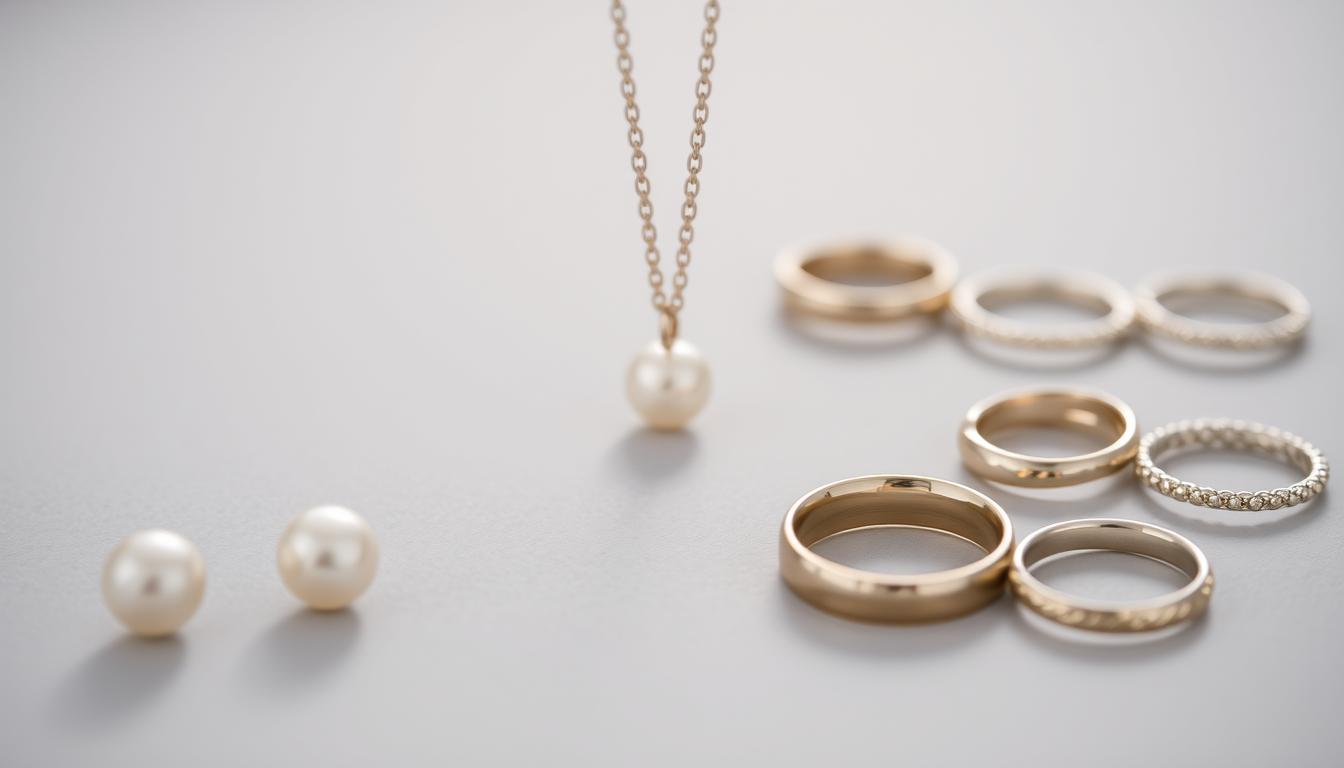
Nickel-Free Jewelry: Hypoallergenic Options for You
We understand the importance of wearing hypoallergenic jewelry that not only complements your style but also ensures comfort and safety for your skin. For individuals

